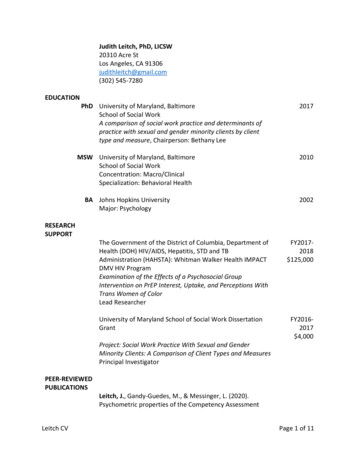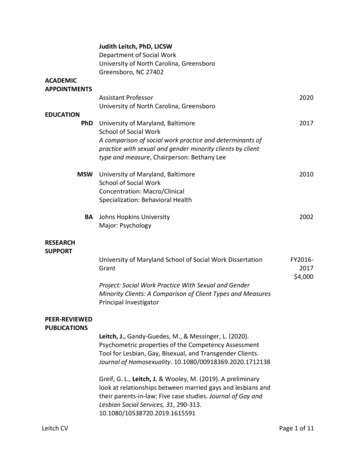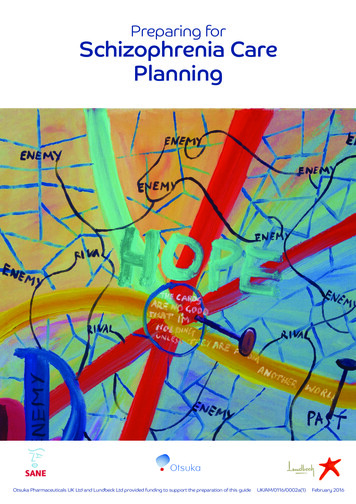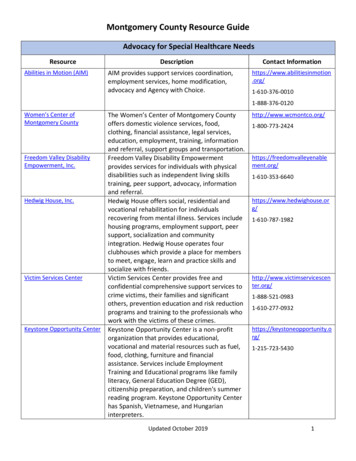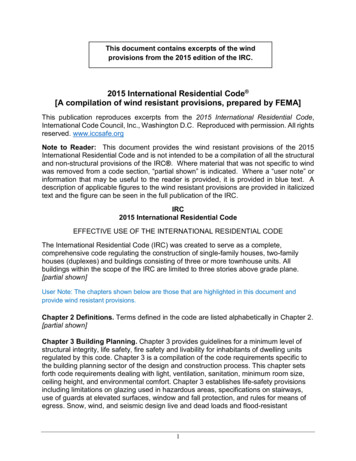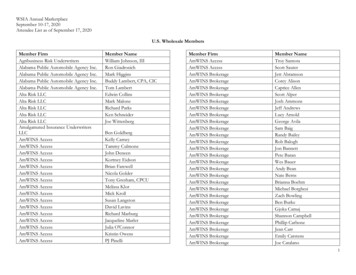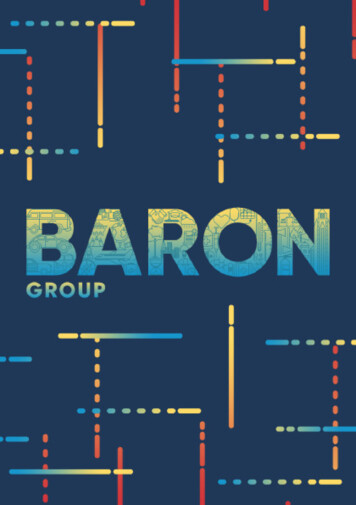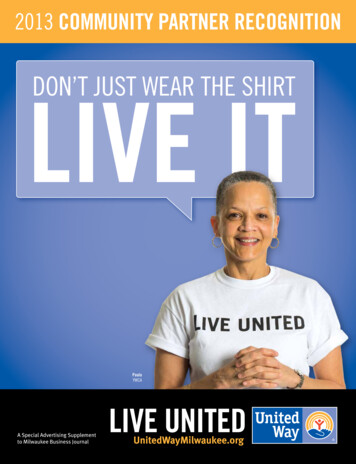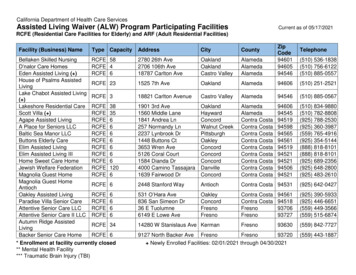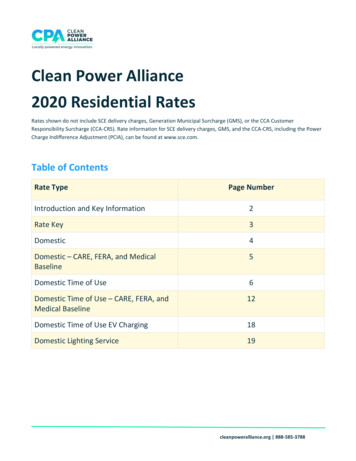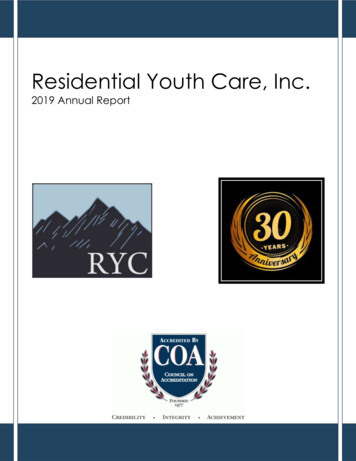
Transcription
Residential Youth Care, Inc.2019 Annual Report
Residential Youth Care, Inc. “The mission of Residential Youth Care, Inc. treatment programs is toadvocate for and foster the safety and well being of youth at risk sothey may lead productive lives.”“The vision of Residential Youth Care, Inc. is to provide superiortherapeutic support services to adolescents and their families inorder to teach Alaska’s youth social, educational, vocational, andemotional success.”“The philosophy of Residential Youth Care, Inc. regarding servicedelivery is based on the Teaching Family model. The goal of thismodel is to teach daily living and social skills the youth can use to helpthem be more successful in relationships, in a career, in childrearing, in problem solving, in the community, in school, and infamily life.”1
Residential Youth Care, Inc. RYC Core ValuesOutcomes: Service Delivery will focus on an improved level of functioning for theconsumer that will result in a decreased need for ongoing services.Accountability: Service will be delivered at a level that meets the consumer’s needs whileadhering to the national standards of practice for the behavioral healthcare, which areclosely and consistently monitored for continuous quality improvement.Choice: The consumer has the right to make informed decisions in his/her treatmentplanning process.Inclusion: Services will be delivered in a manner most responsive to the consumers needsand in the least restrictive manner and setting that is appropriate for the consumer.Diversity: Services will be delivered in a manner that respects the diversity of ages,cultures, needs, experiences, and goals of the consumer when developing standards, serviceplans, and interventions.Collaboration: Service delivery should include active collaboration with other peopleand/or organizations that are important to the consumer’s life to ensure that service planseffectively use all available resources to achieve intended outcomes.Advocacy: RYC will advocate for our community’s acceptance and understanding of thepeople who experience mental health issues to ensure their respect and dignity as citizens andaccess to resources will support productive and satisfying lives.Participation: RYC will engage the consumer in a collaborative partnership identifyinghis/her needs, establishing goals, and selecting interventions resulting in his/herempowerment to act on improving emotional and social functioning.Accessibility: RYC will provide equitable access to quality services to culturally andethically diverse consumers based on individual levels of need and will strive to eliminatebarriers to services.Confidentiality: RYC is committed to maintaining confidentiality and understands thesensitivity of information regarding clients’ psychiatric condition, social, emotional, ormental health issues; and social, family, and developmental history. Client specificinformation collected will not be released unless necessary to serve the client and family, andonly if authorized with a signed release, in order to provide the best possible care.2
Residential Youth Care, Inc. Residential Youth Care, Inc.is governed by a sevenmember board of directors,representing a cross-sectionof the community. All RYCBoard Members are currentresidents of Ketchikan,Alaska. They have a widerange of backgrounds andexpertise.2019RYC Board of DirectorsDavid SweetmanPresidentRetired TeacherBryan SchulzVice PresidentAttorney at LawTodd MacManusTreasurerPresident/CEO, First BankBill ElbersonBoard MemberRealtor, Re/Max RealtyFred JorgensenBoard MemberRetired Sea Alaska TimberCruiserJoy MurphyBoard MemberRealtor, Re/Max RealtyTony RigoniBoard MemberRetired United States CoastGuard3
Residential Youth Care, Inc. 4
Residential Youth Care, Inc. “RYC operates on a philosophy emphasizing a culture of care and the buildingof therapeutic relationships through the development of positive, supportive,and planned therapeutic interventions delivered by knowledgeable,empathetic, and skilled staff.”- Dustin Larna, RYC CFO-COORYC’s Dedication to Trauma-Informed CareResidential Youth Care, Inc. programs are based on components of the TeachingFamily model. The goal of this model is to teach effective daily living using 15 keysocial skills. Youth and families can use these skills to help them be moresuccessful in relationships, in career development, in child-rearing, and inproblem-solving in the home, school, and community. These skills are developedusing the teaching interactions delivered through the building and maintenanceof supportive therapeutic relationships, which typically begin and are cultivatedin the residential setting. RYC also incorporates the use of rationales, behaviorobservation and feedback, and a motivational point system to assist clients inestablishing positive and pro-social behaviors.RYC promotes Trauma-Informed Care, providing services with consideration ofthe trauma that has occurred in youths’ lives so asnot to re-traumatize individuals in treatment. Wemaintain a careful balance between structure and“Residential Youth Care, Inc.support.recognizes a large proportionof youth and families havebeen impacted by trauma, andare responsive to this need byproviding trauma- informedcare. To this end, RYC strivesto provide services that reflectthe following principles:Safety, Trustworthiness,Collaboration, Empowerment,Family & Youth Voice, Choice,Language Access, andCultural Competency.”5
Residential Youth Care, Inc. Our HistoryRYC has been providing residential behavioral healthservices to Alaskan youth for 30 years, opening its doorsfor services on October 7, 1989. What began as a five-bed,two-staff home, operating as a therapeutic foster caresetting for youth in crisis and has grown into a 30-bedfacility. RYC has five buildings including the Main and Hill House Facilities, theClient Services Building, The Education Center, and the newly acquired ReMaxbuilding. The Main House has 20-beds and houses all male youth. The HillHouse has 10-beds and houses all female youth. Additionally, RYC serves another15-20 youth and families through out-patient and aftercare services. RYC haslicensed four families with twelve therapeutic foster care beds.Founder, Jack Duckworth, began working with teens when he was the young ageof 19 years old, and, in his words, “got the passion.” Since that time he has madeit his life’s work to help troubled teens achieve success, and he devotes much ofhis time to educating and supporting their families as well.In June 2001, a young Idahoan,Dustin Larna, began work at RYC as afloor staff, and “got the passion” forworking with teens as well. Mr. Larnaquickly picked up skills to effectivelywork with youth, and advanced toAssistant Director and was laterpromoted to CFO/COO of RYC.ServingAlaska’sYouth &FamiliesSince 19896
Residential Youth Care, Inc. RYC RESIDENTIAL PROGRAMSAll youth in residential treatment are provided a behavioral health assessment,individual and group psychotherapy, daily therapeutic behavioral rehabilitationservices (individual and group), case management services, and substance abusecounseling. School support and family services are also provided as needed, asdetermined by an individual treatment plan.Emergency Shelter Stabilization & Assessment Program Level II The Emergency Shelter program provides crisis stabilization and assessments tomale and female youth ages 10-19 years. The populations best served in thissetting are youth that require a 45 day placement with emergency shelter servicesthat include a behavioral health assessment and diagnosis, treatmentrecommendations and individualized treatment planning, behavioral support andskill instruction within a structured treatment environment, family mediation,school planning, and transition support for youth moving to another residentialplacement.RYC can provide short-term residential treatment through the emergency shelter,with the option of extended shelter placement of up to 90 days depending ontreatment recommendations and as deemed necessary and appropriate by thetreatment team. Ongoing assessment and re-evaluation of the treatment plan isconducted as partof the short-termprogram.7
RYC’s main program focuses on the development of the following 15 Core Social Skills:Residential Youth Care, Inc. Following Instructions Accepting Feedback ReportingWhereabouts Asking Permission Accepting the Answer “No” Saying “No” to a Peer Rational Problem Solving School Success Promptness Health Accepting Compliments Giving Compliments Honesty SODAS process for decision making Peer & Adult RelationsRYC ProgramsLong-term Residential Treatment Program Level III The Long-Term Program provides an array of services for youth who require outof home treatment due to behavioral/emotional disturbances, mental healthsymptoms, and/or functional impairments, and are unable to live successfully ina less structured environment. The treatment program generally lasts between 6months to 1 full year, though it can be shorter (90-180 days) or longer (18months) depending on individual client needs and progress toward treatmentgoals.The program provides supervision structure, and support through initial andongoing assessment in a quality treatment environment and implementation ofthe individualized treatment plan, including independent and group living skillsdevelopment, individual and group counseling, and family counseling/mediation.RYC utilizes individual, group, and family counseling under a team ofprofessionals, including master’s level professional mental health counselors.8
Residential Youth Care, Inc. RYC Community ProgramsRYC offers a variety of community- based programs andservices to meet the needs of youth and families as partof a comprehensive continuum of care.Transition to Independence Process TIP RYC offers services for youth transitioning to independence and adulthood!Transitional age youth at RYC have the opportunity to participate in thefollowing: Ansell-Casey Life Skills Assessment Individualized Success in Adulthood Plan Life Skills GroupThe TIP model focuses on five Success for Life Packet5-transition domains to Assistance in finding training, employment,provide a well-rounded andstrategic approach to helpand/or college fundingfacilitate a successfulindependence:1. Employment & Career2. Educational Opportunities3. Living Situation4. Community LifeFunctioning5. Personal Effectiveness &Well-beingThe TIP model utilizes 7 Core Practices that assista young person in developing the skills andabilities needed to achieve successfulindependence and self-sufficiency. These corepractices are as follows: Strengths Discovery & Needs Assessment Futures Planning with Life Visioning (in eachlife domain) Rationales (guided cause & effect reasoning) In-Vivo Teaching (in-real-life instruction &practice)“This experience has taught me SODAS Problem- Solving Processthat even if you don’t think you What’s Up Prevention Planningare good at something, you can SCORA Mediationstill be what you want to be. Ilearned you don’t have to havea lot of money to get theexperience to excel your skills tothe next level. This was anexperience I would not havereceived without RYC. It hashelped me realize my dream ofbecoming a tattoo artist.”– Youth (16 years old)9
Residential Youth Care, Inc. RYC Community ProgramsTherapeutic Foster Care TFC RYC offers therapeutic foster care to youth needing a structured homeenvironment with foster parents trained in RYC’s program to implement specifictherapeutic interventions. TFC services are recommended for youth either as astep-down from residential treatment to practice pro-social behaviors in a lessrestrictive environment prior to transitioning home, or for youth needing asmaller, more controlled environment than residential treatment. Youth in TFCare eligible to receive all the services offered to youth in residential treatmentdepending on the needs and recommendations identified in the individualizedtreatment plan.Parent Orientation ClassRYC offers Parent OrientationClass to all parents, caregivers,and families of RYC clients, taughtby RYC’s CEO, Jack Duckworth.The class is conducted in two 2hour sessions that provide parentsand youth with an overview ofRYC’s programs, strategies forcontinued social skill developmentand a behavior contract in the home. The class culminates in a behavioralcontract that is created collaboratively between RYC’s CEO, parents/caregivers,and the youth.School Success ProgramEducational success is a vital part of life success for youth experiencingbehavioral/emotional difficulties. RYC Educational Department staff works withyouth to learn skills that teach how to plan and prepare for academic success andachievement. RYC provides year round access to academic curriculum thatprovides the opportunity for credit recovery and advancement.10
Residential Youth Care, Inc. RYC Community ProgramsThis includes weekend study skills groups. The youth are also able to access theGED path for graduation if it is applicable to their needs and academic standing.The RYC Educational program provides the opportunity for using the social skillsform the RYC model and encourages their application during the educationalday. RYC also acts as liaison between youth, their parents and the school districtfor optimum academic performance.RYC works closely with the Ketchikan Gateway Borough School District aspartners in education. Our Memorandums of Agreement allows for the use ofschool facilities and materials outside the normal parameters of public access toKGBSD facilities, personnel and materials.Out-Patient Aftercare Services The following services are available to youth and their families in the out-patientsetting: Individual, family, and/or group therapy School support services Case Management servicesThese services are recommended for youth transitioning home from residentialtreatment or other out of home placement/ residential treatment.11
Residential Youth Care, Inc. After school programs in Alaska help keep kids safe, inspire learning, andgive working parents peace of mind. Kids discover who they are and whatthey love to do, make smart choices, and avoid risky behaviors. After schoolprograms help youth attend school more often, get better grades, and buildfoundational skills, like communication, teamwork, and problem solving.RYC Community ProgramsPositive Youth Development Afterschool Program PYDAP In the spring of 2018, Senator Giessel and Representative Claman lead asuccessful legislative effort to create the Alaska Marijuana Education andTreatment Fund, which established the Positive Youth Development After schoolGrant Program (PYDAP). RYC received a PYDAP grant award, to provide afterschool and summer programming services to children and their families in 5th –8th grade; although younger grades are welcome to participate. This new grantprogram will expand access to and enhance after school and summer learningoptions for youth, in the Ketchikan Gateway Borough School District, who arewaiting to be engaged in positive out-of-school-time activities. Research showsthat youth engaged in high-quality after school and summer learning activitiesare less likely to engage in risk behaviors such as substance use. RYC is dedicatedto the well-roundedyouth supports andare invested in thelong-term success ofour youth andfamilies.12
Residential Youth Care, Inc. RYC CommunityProgramsRYC’s PYDAP program hopes to:increase students’ school dayattendance and reduce chronicabsenteeism; reduce riskybehavior and behaviorinfractions, includingsuspensions; help youth be moreexcited about learning andengaged in their classrooms; and promote academic achievement, on-time gradepromotion, and graduation; and provide supports for working parents that helpkeep families connected to their students’ education.The PYDAP program will provide youth with a safe a place to go after school,hands-on learning experiences, help with homework, offer nutritious snacks,opportunities for physical activity, allow youth to engage with positive rolemodels, and help gain valuable life skills. RYC has a long, successful history ofsupporting the whole child in our clinical, residential, therapeutic foster care, andout-patient programming. RYC is excited to be able to offer PYDAP services andprogramming to the children in the Ketchikan community.13
Residential Youth Care, Inc. RYC Community ProgramsTobacco Prevention & Control Program TPC BreatheDeep &Enjoy LifeResidential Youth Care, Inc.’s TobaccoPrevention and Control (TPC) grant program was established in 2018.The primary goals of RYC’s TPC program are: Work with community leaders to increase the price of tobacco products Support implementation and enforcement of tobacco-free schools Support a comprehensive community-based approach to restrict minor accessto tobacco products Promote public awareness regarding the health benefits of tobacco cessationand resources for tobacco cessation, including Alaska’s Tobacco Quit Line andother local cessation resources Engage healthcare systems to implement tobacco control policies consistentwith the U.S. Public Health Service Clinical Practice Guidelines for TreatingTobacco Use & Dependence,including working with systems toask, advise, refer, and documenttobacco use and follow-up Work with large employers toimprove employee health plans toprovide and promote utilization ofcomprehensive coverage ofrecommended tobacco dependencetreatments, including promotingquitting and healthcare benefitsthat support quittingRYC’s TPC program has beenworking hard to accomplishimportant public health goals in thecommunity of Ketchikan. The TPCCoordinator is working with theKetchikan Gateway Borough SchoolDistrict to provide tobacco and ecigarette use prevention curriculumto students in their health class.14
Residential Youth Care, Inc. RYC Community ProgramsWorkshops and training presentations are held for RYC staff, KGBSD staff, andparents. Informational tables are set up with RYC’s pig lung demonstrationduring parent-teacher conferences, health fairs, and in the KGBSD high schoolcommons area during lunchtime.Within the City of Ketchikan and Ketchikan Gateway Borough; RYC’s TPCProgram Coordinator has advocates with policy makers and elected officials toreduce youth access to tobacco products through the Tobacco 21 Law. Theordinance will raise tobacco taxes and raise the legal purchasing age of tobaccoproducts from 19 to 21 years old.At the State and Federal level; RYC’s TPC Program Coordinator is working withlegislators and statewide partner organizations such as: The American CancerSociety, Cancer Action Network, American Lung Association, and Breathe FreeAlaska to pass legislation to raise tobacco excise taxes, Tobacco 21, restrict andregulate e-cigarette and flavored tobacco products. Additionally, legislation wassuccessfully passed prohibiting smoking in the workplace.RYC’s TPC program has helpedpeople in the community ofKetchikan stop using tobacco byoffering, “Not On Tobacco” youthtobacco cessation clinics and“Freedom From Smoking” adulttobacco cessation clinics. RYC’sTPC program supports andpromotes the Alaska Tobacco QuitLine and have launched the“Breathe Deep and Enjoy Life”media campaign in Ketchikan.The campaign has spreadthroughout the State of Alaskaand is being promoted by otherTobacco Prevention and Controlgrantees.15
Residential Youth Care, Inc. RYC 2019 Statistics Demographics of Youth Served during 2019 Client GenderFemaleYouth, 37%MaleFemaleMale Youth,63%Ages of Clients 0.00%20.00%10.00%0.00%Ages 0-12 (8.7%)Ages 13-17(87.8%)16Ages 18-20(3.5%)
Residential Youth Care, Inc. RYC 2019 Statistics Demographics of Youth Served during 2019 Client EthnicityCaucasian- 39.1%Black - 2.6%AK Native - 26.1%Asian - 0.9%American Indian - 2.6%Pacific IslanderHispanic - 3.5%Multiracial - 27%Unknown - 0.9%Referring CommunitiesKetchikan (44%)Metlakatla (2%)Prince of Wales (4%)Sitka/Wrangell (3%)Petersburg (1%)Juneau (11%)Kenai (3%)Anchorage (17%)Wasilla (6%)Fairbanks (2%)Other (7%)17
Residential Youth Care, Inc. RYC 2019 StatisticsYouth Discharge Reasons or Still in RYC Treament Programs45403530252015105018
Residential Youth Care, Inc. RYC 2019 StatisticsYouth Placed ByOffice of Children's ServicesDivision of Juvenile JusticeFamily010203040Adverse Childhood Experiences 5.00%0.00%1-2 ACE's3-4 ACE's195-6 ACE's7-8 ACE's
Residential Youth Care, Inc. RYC 2019 Program Highlights RYC Youth RYC served a total of 115 youth (unduplicated) in our Residential and Communitybased programs during FY2019. RYC served 26 (duplicated) youth in Out-Patientservices, 29 youth (duplicated) in Therapeutic Foster Care program, and 42 youth(duplicated) in our Transition to Independence Process program. Out of the 115youth; 28 youth successfully completed treatment and returned home, 48 youthwere discharged for other various reasons (see chart on page 18), and 39 youthare still receiving services at the end of 2019. A total of 28 youth had Division ofJuvenile Justice involvement in their treatment, 33 youth had Office of Children’sServices involvement in their treatment, and 54 youth were placed by their familyor caregiver who were involved in their treatment (see chart on page 19). Theaverage length of stay for youth in Level II residential treatment is 40.3 Days andin Level III residential treatment is 101.2 Days (see chart below).Length of Stay300244.3 Days250200150101.2 Days1005084.3 Days40.3 Days0Level IIEmergencyShelterStabilization &AssessmentLevel IIIResidentialTreatment20TherapeuticFoster CareOutpatient
Residential Youth Care, Inc. RYC 2019 Program Highlights RYC Expansion In October of 2018; RYC purchased a newbuilding, locally known as the “ReMax”building. The building is on the corner ofFirst Ave. and Jefferson, located next doorto RYC’s Main House facility. RYC gainedaccess to the building in January of 2019,giving the previous business occupants timeto relocate to another location. Since then, the new building has undergone someminor renovations and aesthetics. RYC plans to utilize the building by moving theRYC Administration Department to the new buildings, which are currently in theClient Services Building; which is also located adjacent to RYC’s Main Housefacility. The new building will provide room for RYC to expand by adding moreoffice space and positions in both the Client Services building and the newbuilding for future utilization. RYC hopes to have the new building completedand the RYC Administration Department relocated to the new building byJanuary 2020. Electronic Health Record System RYC achieved one of the organization’s long term strategic planning goals; toimprove technology by implementing an electronics health records (EHR) systeminto our programming. RYC staff and Care Logic collaborated to create anddevelop pertinent features, and customize the system. RYC’s EHR system went“Live” the beginning of August 2019. RYC staff continues to collaborate with CareLogic to improve enhancements and other features, and any inconsistencies thatarise.21
Residential Youth Care, Inc. RYC 2019 Program Highlights Matrix Model RYC contracted with the Clare Foundation andThe Matrix Institute on Addictions to provide athree day training on the model, fidelity, bestpractices, and trauma-informed aspects of themodel to implement the substance use disorder(SUD), evidence-based Matrix Model; to expandRYC’s SUD programming and service treatmentoptions to youth at RYC and in the community of Ketchikan. RYC clinical staffprovides SUD Matrix Model weekly groups to at risk youth: Early Recovery, Introto the 12 steps, and Relapse Prevention.Partnerships Public Health & WISH RYC partnered with Ketchikan Public Health and Women In Safe Homes (WISH)to deliver clinic services including immunizations, family planning, reproductivehealth education, sexually transmitted infection screening, and health educationto at-risk youth and young adults to strengthen community resources andnetworks of support to enable this population to achieve optimal physical, social,and emotional health. The “3- R’s” (Rights, Respect, Responsibility) curriculum isa eight week course and meets the National Sexuality Education Standards andseeks to address both the functional knowledge related to sexuality and thespecific skills necessary to adopt healthy behaviors.22
Residential Youth Care, Inc. Ketchikan Youth Initiatives RYC continued our partnership with Ketchikan YouthInitiatives (KYI). RYC and KYI partnered withKetchikan Indian Community (KIC) Education &Training Department to develop a summer youthwork program. The goal of the program is to finish a remodel project on KYI’sYouth Community Center building. RYC and KIC recruited a group oftransitionally aged youth to join a work crew. The crew is youth ages 18-28 yearsold and supervised by a general contractor. The work crew is learned workreadiness skills while working on the remodel of the building. RYC obtained alease agreement from KYI to lease the lower level of the KYI building. The goal isto expand RYC’s Transition to Independence Process (TIP) program andintegrate transitionally aged youth (TAY) into services, activities, resources, andeducation; at the KYI building. RYC hopes by having another location other thanRYC’s Residential settings/facilities will reduce the stigma youth perceive toreceiving services and increase youth engagement and retention that are 18 yearsold or older in services and past the point they are required to. RYC iscollaborating with partners and other local agencies to provide services, activities,resources, and education to the TAY population.23
Residential Youth Care, Inc. Events RYC Youth Photo Club Exhibition The RYC Youth Photography Club held a photo exhibition titled, “Perspectives ofNegative and Positive Space.” The Youth Photo Club extended invitations tofaculty, staff, affiliates, guests, and youth to attend an exhibition of selectedworks. The gallery exhibit featured photographs of and slideshows byapproximately 10-15 RYC youth. Guests participated by voting on “Best in Show”and runners-up for inclusion in RYC’s art collection.“BEST IN SHOW”“Runner UP”1st Place2nd Place24
Residential Youth Care, Inc. RYC 2019 Program Highlights Human Trafficking, Vicarious Trauma, Compassion Fatigue, &Opioid/Heroin Addiction RYC collaborated with the Federal Bureau of Investigation and U.S. Attorney’sOffice to provide a community awareness event in April of 2019. Featuredpresentations included: Human Trafficking by FBI Special Agent Goeden,Compassion Fatigue and Vicarious Trauma by FBI Victim Specialist, Erin Terry,and Opioid/Heroin Addiction by Yulonda Candelario, Law Enforcement, Reentry& Community Outreach Coordinator, and U.S. Attorney’s Office, U.S.Department of Justice. Stop the Stigma In partnership with the KetchikanWellness Coalition (KWC) the 2ndAnnual Stomp the Stigma RecoveryMarch and Resource Rally was held inearly September of 2019; at The Plazamall. Guest speaker included: ArikaPaquette, WISH Prevention andEducation Coordinator, who spokeabout Adverse Childhood Experiences;Lindsay Lamont, Ketchikan PublicHealth RN, who spoke about Addictionand Narcan; and Dustin Larna, RYC CFO-COO who spoke about trauma, hopeand resiliency. Additionally, there were some guest speakers who are now inrecovery who spoke about their journey with addiction and their road to recovery.A video recorded by the U.S. Surgeon General was aired to the public attendees.Approximately twenty-one local agencies participated in the event withinformational and resource tables.25
Residential Youth Care, Inc. RYC Facilities Main House RYC’s Main House Facility(pictured left) house male youthin our programs and is licensedto accommodate twenty youth. Hill House RYC’s Hill House Facility(pictured left) house femaleyouth and is licensed toaccommodate ten youth.26
Residential Youth Care, Inc. RYC Facilities Education Center RYC’s Education Center(pictured left) is located next tothe alternative high school andprovides school supportservices. RYC is able to workwith youth in lieu of suspension.The KGBSD agreed to enrollyouth within three days ofentering into RYC’s programsto reduce the amount of timeyouth are out of school. Client Services RYC’s Client Services building(pictured left) houses RYC’sClinical and Case ManagementTeams. Treatment teammeetings, individual, group, &family counseling, psychiatricservices, training, board &department meetings are heldin the Client Services building.27
Residential Youth Care, Inc. RYC Facilities Administrative Building RYC’s newly acquiredAdministrative building(pictured below) is locatedadjacent to RYC’s MainHouse facility. RYC’s HR,Billing, Accounting, andExecutive AdministrativeAssistant are all located inthe building.28
Residential Youth Care, Inc. RYC Financial Information Funding Sources Below are the funding sources Residential Youth Care, Inc. received during 2019.* State of Alaska, Department of Health and Social Services, Behavioral Health;Residential Care for Children and Youth Grant- Residential Treatment Programs* State of Alaska, Department of Health & Social Services, Behavioral Health;Comprehensive Behavioral Health Treatment & Recovery Grant- Transition toIndependent Process (TIP) Program* State of Alaska, Department of Education & Early Development, NationalSchool Lunch Program* State of Alaska, Department of Health & Social Services, Juvenile Justice;Federal Formula Non-Secure Attendant Care Shelter Grant* Department of Health & Social Services, Public Health; Tobacco Prevention andControl Grant* Medicaid Revenue29
Residential Youth Care, Inc. Residenti
Ansell-Casey Life Skills Assessment Individualized Success in Adulthood Plan Life Skills Group Success for Life Packet Assistance in finding training, employment, and/or college funding The TIP model utilizes 7 Core Practices that assist a young person in developing the s
